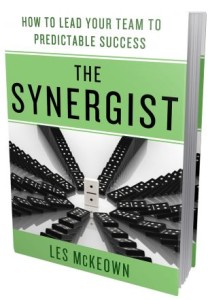 The Operator: Part 3 of 5 in a series on the book The Synergist: How to Lead Your Team to Predictable Success by Les McKeown
The Operator: Part 3 of 5 in a series on the book The Synergist: How to Lead Your Team to Predictable Success by Les McKeown
ACTION: In a constant state of forward motion
DOERS: Makes lists of To Dos, loves to check off tasks completed
SIMPLIFYER: Eliminates unnecessary processes and redundancy
FIXER: First one to put hand up and make it right, which leads to….
OVER COMMITTER: Bottomless pit of To Dos
FINISHERS: Great to have on the team, finishing leads to crossing an item off the To Do list
I have many of these tendencies, but as I learned, you can be more than one from the Visionary, Operator and Processor. It just depends on the percentage of factors that make up your business demeanor. Some may look at this Operator as a non-stop, just do it kind of person and wonder “Do they SLEEP?” or “I’m a slacker compared to this overly energized human being”. It’s all relative as tendencies begets other tendencies. Such as the Operator becomes an innovator because they keep taking on tasks that they want to fix, but it may not even be in their wheelhouse. So, they have to dig in, research, find the best options and solutions to make it right. Yes, it sucks the time out of their lives, but that is where their comfort level lies and time management does not apply as they operate on a 24/7 basis. Whereas the Visionary geeks out on coming up with and wanting to pursue their idea, the Operator gets energized at making it happen.
Sounds like an ideal person to have around, right? In terms of getting work done, that would be correct. In terms of collaboration with other team members and the cooperating with scheduled meetings and company processes in general, its not a sure thing. I loved how Les McKeown phrased the Operator’s methodology: Their own processes often have a semi-unofficial, clandestine status- detached from the rest of the organization, certainly not approved, but overlooked so long as they get the job done and dont get in anyone’s way”.
Think of growing a company and being intentional about it’s focus, milestones and tasks. Meeting after meeting, long hours of work, edits, additions and deletions come into play and finally, a business has a roadmap to their success. How does an Operator fit into this? First of all, scratch the meeting part. Too much detail and processes involved in the planning. Just give them the list of how they fit in and what are their to dos and send them on their merry way to get it done the way THEY determine HOW it should get done. They know their skills and strengths and if they need to innovate to get the task done and check it off their list, you can count on them to follow through with everyone else’s rhetoric. They will prioritize, as they already have too many items on their list and force everyone back to focus on the original plan, as the Visionary has already gone off to create another idea and more work.
Of course there are weaknesses to this character, and because I identify with this Operator mentality the most, I will keep the list brief. All joking aside, we already see there is always a weak side to these types of business icons. The Operator demonstrates impatience, especially with meetings, processes and delays, appearing to be emotional and somewhat rude when it comes to engaging. Because they shy away from overly processed ideas, they implement more shortcuts and work-arounds to just get the job done and others may find their work hard to follow. And, from my understanding, the phrase “I’d rather ask for forgiveness rather than permission” originated with an Operator, lacking true commitment to the chastisement of their managers.
Tips from McKeown on how to best utilize this Operator? Ask to “see” them for a 15 minute coffee to discuss ideas. Solicit their advice as their ability to consult on an idea is a valuable skill. Develop a mutual understanding of tasks and outcomes and be in relationship with the Operator. Make sure they are invited to the meetings that best utilize their knowledge and integrate them into the discussion of ideas rather than processes. Apply firm and consistent directions, instructions and expectations and abolish the woodshed approach to keeping them in line. The key to working with, for or next to an Operator is making their world the best it can be and they will return the favor!

